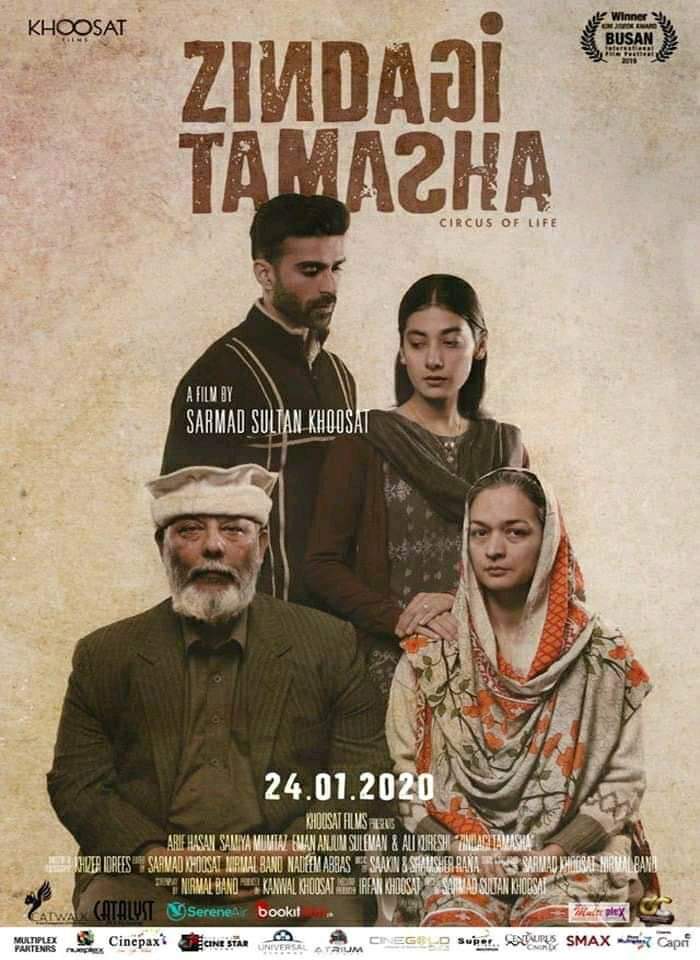Zindagi Tamasha
Introduction
It is still a Tuesday and this little week once again has presented me with an opportunity to explore for some content around the globe. And first up, I decided to watch and review the Pakistani film Zindagi Tamasha which is now streaming on Youtube. The film did generate a lot of buzz on social media given how the film was banned from releasing in their own country. This was particularly surprisingly given that the film did have valid censor certificates while also being Pakistan’s Official Entry to the 93rd Academy Awards almost a couple of years ago. It is particularly sad when filmmakers do not get the creative freedom while making their dream project, and even if they do, their work doesn’t seem to see the light of the day. We as a society really need to evolve in that respect while being more accepting towards art and the message that it is trying to convey. Here, it was indeed brave of the filmmaker to release his dream project directly on Youtube, ironically in the month of Independence, which would have been so heartbreaking. And this sentiment itself, made me want to watch and review Zindagi Tamasha, and in a way support it, without quite knowing what the film is about. So then does Zindagi Tamasha manage to impress, lets find out.
Story & Screenplay
Zindagi Tamasha follows the story of a conservative protagonist who composes and recites religious hymns for a living. This, until an event turns his life forever! The story here is beautifully aching and painfully tragic particularly because the event concerned involved dancing, a symbolic form of happiness which is construed as a sign of feminism in the conservative society. I remember while in school, there was a clear distinction of the kids who should be allowed to dance and whom should not. And that itself is another level of conservative thinking of an art form that symbolizes liberty. The screenplay standing at a shade above two hours(this wasn’t the director’s cut) does make for a poignant watch that lingers on long after the film has ended. This section will contain spoilers, so viewers discretion advised!
The drama does open with a glimpse of the protagonist recording one of his religious hymns that itself paints a fair picture of his conservative nature. He is leading a normal happy life with his ailing wife with his daughters for company. The writers do well in further exploring the facade of the society who frowns upon the existence of transgenders who are often reduced to people dancing at the wedding. This is also reflective of the mindset of the protagonist who almost looks down upon them while being a closet dancing waiting to break the shackles too. A moment of liberting a part of him in the art form one night results in dire circumstances after a video involving him goes viral!
The writers present a nuanced take on the brutally conservative nature of the society by highlighting the fact that all is well until we find ourselves on the wrong side of the mayhem. We live in a generation of social media that brings with it, its share of trolls and memes forming a daily dose of our entertainment. Yet, what might seem to be funny to us might be completely shattering for the ‘victim’ involved, and that is what is addressed beautifully in the film. The character development beautifully nurtured especially that of the protagonist who continues to remain grey in terms of his conservative nature while finding support only in the form of his ailing wife. So he continues to look down upon the thought of a transgender resorting to the act of dancing while only briefly empathizing in a moving scene involving him foregoing his rent.
Yet, the challenge for the protagonist in surviving in an even more conservative society is accentuated with the religious elements that begin to creep into the drama. Those set of events ensure that even his livelihood of reciting religious hymns is considered a blasphemy while he soon runs out of work. The twist involving the death of his lone support unleashing a whole new level of depression which is layered painstakingly in the drama. The bouts of anger directed towards his daughter stem from his loneliness while still latching on to the thought of the one person who had always supported him right throughout. The final frame involving him reciting the song on which he had previously danced to represents contrasting emotions – while previously it was of joy and liberation, here it is that of surrendering to his fate of loneliness and depression. It was such an aching end that stays with you long after it has ended! Overall, a wonderfully well written screenplay!
Dialogues, Music & Direction
The dialogues are conversational but present the conservative nature of the society, beautifully so. The music represents the different moods of the drama wonderfully well. The situation created was such that the same song(with its title borrowed from it) had multiple shades to it, which also was representative of the dual nature of the society. This while also presenting a memorable soundtrack. The BGM is sparingly used almost allowing the atmospherics of the drama to take over.
The cinematography is beautiful highlighting the gloominess of the drama wonderfully well. Also, the frames are beautifully positioned. I would be citing two instances, firstly we see the protagonist walking down a spiral staircase that represents the never ending labyrinth. Secondly, there is a scene towards the end of the film involving the protagonist standing alongside his daughter with a wall separating them, representing their strained relationship. It was a beautiful aspect of filmmaking that accentuated the drama ten fold. The editing is crisp and sharp.
Director Sarmad Sultan Khoosat handles this provocative yet delicate subject with utmost sensitivity. There is a certain sense of dignity in his craft which is reflective of so many scenes that he has constructed here. His ability to create contrasting emotions was such a joy to watch. The direction is brilliant here!
Performances
The performances are quite brilliant here. Arslan Khan as Asad, Darvaish Kasae, Nadia Afgan and Sikandar Nawaz Rajput are wonderful in their respective roles. Ali Kureshi as Danish is first rate and does a swell job. Eman Suleman as Sadaf is a character going through her own set of vulnerabilities and perceptions about her father. And she was just so brilliant to watch. Samiya Mumtaz as Farkhanda delivers a heartfelt performance as the soft-hearted wife who can see through the shackles of the society and treat the art-form as a sign of joy and liberation. She was excellent here. But it is Arif Hassan who is simply brilliant in the character of Rahat. His body language and mannerisms beautifully portray the plight of his character who is carrying a mountain of pain within him. The emotions are palpable and they do touch you achingly so!
Conclusion
Zindagi Tamasha is a beautifully melancholic drama which is painfully tragic and subtly aching thus making for a brilliant watch. Available on Youtube and Highly Recommended!




